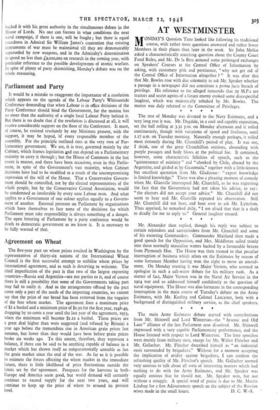AT WESTMINSTER
MONDAY'S Question Time looked like following its traditional course, with rather more questions answered and rather fewer be Memrs in their places than later in the week. Sir John Mellor asked a characteristically searching question about the County Court Fund Rules, and Mr. De la Bere aroused some prolonged exchanges on Speakers' Courses at the Central Office of Information by asking, with customary pith and pertinence, " why not get rid of the Central Office of Information altogether ? " It was after this that Mr. Bowles rose with due solemnity to ask Mr. Speaker whether a passage in a newspaper did not constitute a prima facie breach of privilege. His reference to the alleged innuendo that 29 M.P.s are traitors and secret agents of a future enemy evoked some disrespectful laughter, which was majestically rebuked by Mr. Bowles. The matter was duly referred to the Committee of Privileges.
* *
The rest of Monday was devoted to the Navy Estimates, and a very long rest it was. Mr. Dugdale, in a cool and capable exposition, set the ball rolling at 3.32 p.m. on Monday afternoon and it rolled continuously, though with variations of speed and liveliness, until 1.17 a.m. on Tuesday morning. Naturally enough perhaps, it rolled most riotously during Mr. Churchill's period of play. It was not, I think, one of the great Churchillian orations, abounding with purple passages and body blows at the political foe. It contained, however, some characteristic felicities of speech, such as the "quintessence of asininity" and "checked by Chile, abused by the Argentine, and girded at by Guatemala," together with a little-known but excellent quotation from Mr. Gladstone: "expert knowledge is limited knowledge." There was also a pleasing moment of comedy when Mr. Glanville interrupted Mr. Churchill, as he was regretting the fact that the Government had not taken his advice, to say : " the electors did not accept your advice." Mr. Churchill did not seem to hear and Mr. Glanville repeated his observation. Still Mr. Churchill did not hear, and bent over to ask Mr. Lyttelton. Thus apprised, he remarked drily, " I am afraid that that is a shaft to deadly for me to reply to." General laughter ensued.
* *
Mr. Alexander then replied, though his reply was subject to certain rejoinders and surrejoinders from Mr. Churchill and some of his escorting Commanders. Commander Maitland then made a good speech for the Opposition, and Mrs. Middleton sailed trimly into these normally masculine waters backed by a favourable breeze from Plymouth Hoe. The House was then treated to that peculiar interruption of business which arises on the Estimates by reason of some fortunate Member .having won the right to move an amend- ment. On Monday evening it was Major Vernon, who scorned to apologise in such a salt-water debate for his military rank. As a matter of fact, Major Vernon was in the Naval Air Service in the 1914 war and so addressed himself confidently to the question of naval equipment. The House was also fortunate in the corresponding interruption in the main course of Tuesday's debate on the Army Estimates, with Mr. Keeling and Colonel Lancaster, both with a background of distinguished military service, as the chief speakers.
* * * *
The _ main Army Estimates debate started with contributions from Mr. Shinwell and Lord Winterton—the " Arsenic and Old Lace " alliance of the last Parliament now dissolved. Mr. Shinwell impressed with a very capable Parliamentary performance, and the House listened with respect to Lord Winterton. The later speeches were mainly from military men, except for Mr. Walter Fletcher and Mr. Gallacher. Mr. Fletcher described himself as " an industrial oasis surrounded by brigadiers." Without for a moment accepting the implication of aridity against brigadiers, I can confirm the refreshing quality of Mr. Fletcher's speech. Mr. Gallacher seemed very anxious to talk about all sorts of interesting matters which had nothing to do with the Army Estimates, and Mr. Speaker was equally anxious that he should not. Mr. Speaker won, but not without a struggle. A special word of praise is due to Mr. Martin Lindsay for a fine Adjournment speech on the subject of the Russian
wives made in the small hours. D. C. W.-S.


































 Previous page
Previous page